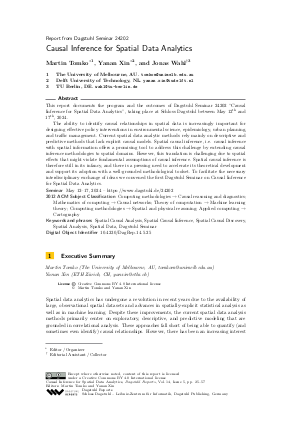Causal Inference for Spatial Data Analytics (Dagstuhl Seminar 24202)
Authors Martin Tomko, Yanan Xin, Jonas Wahl and all authors of the abstracts in this report
-
Part of:
Issue:
Dagstuhl Reports, Volume 14, Issue 5
Part of: Volume: Dagstuhl Reports, Volume 14
Part of: Journal: Dagstuhl Reports (DagRep) - License:
 Creative Commons Attribution 4.0 International license
Creative Commons Attribution 4.0 International license
- Publication Date: 2024-11-26
File

PDF
DagRep.14.5.25.pdf
- Filesize: 2.4 MB
- 33 pages
Document Identifiers
Subject Classification
ACM Subject Classification
- Computing methodologies → Causal reasoning and diagnostics
- Mathematics of computing → Causal networks
- Theory of computation → Machine learning theory
- Computing methodologies → Spatial and physical reasoning
- Applied computing → Cartography
Keywords
- Spatial Causal Analysis
- Spatial Causal Inference
- Spatial Causal Discovery
- Spatial Analysis
- Spatial Data
- Dagstuhl Seminar
Metrics
- Access Statistics
-
Total Accesses (updated on a weekly basis)
0PDF Downloads0Metadata Views
Abstract
This report documents the program and the outcomes of Dagstuhl Seminar 24202 "Causal Inference for Spatial Data Analytics", taking place at Schloss Dagstuhl between May 12superscript{th} and 17superscript{th}, 2024.
The ability to identify causal relationships in spatial data is increasingly important for designing effective policy interventions in environmental science, epidemiology, urban planning, and traffic management. Current spatial data analytic methods rely mainly on descriptive and predictive methods that lack explicit causal models. Spatial causal inference, i.e. causal inference with spatial information offers a promising tool to address this challenge by extending causal inference methodologies to spatial domains. However, this translation is challenging due to spatial effects that might violate fundamental assumptions of causal inference. Spatial causal inference is therefore still in its infancy, and there is a pressing need to accelerate its theoretical development and support its adoption with a well-grounded methodological toolset. To facilitate the necessary interdisciplinary exchange of ideas we convened the first Dagstuhl Seminar on Causal Inference for Spatial Data Analytics.
Cite As Get BibTex
Martin Tomko, Yanan Xin, and Jonas Wahl. Causal Inference for Spatial Data Analytics (Dagstuhl Seminar 24202). In Dagstuhl Reports, Volume 14, Issue 5, pp. 25-57, Schloss Dagstuhl – Leibniz-Zentrum für Informatik (2024)
https://doi.org/10.4230/DagRep.14.5.25
BibTex
@Article{tomko_et_al:DagRep.14.5.25,
author = {Tomko, Martin and Xin, Yanan and Wahl, Jonas},
title = {{Causal Inference for Spatial Data Analytics (Dagstuhl Seminar 24202)}},
pages = {25--57},
journal = {Dagstuhl Reports},
ISSN = {2192-5283},
year = {2024},
volume = {14},
number = {5},
editor = {Tomko, Martin and Xin, Yanan and Wahl, Jonas},
publisher = {Schloss Dagstuhl -- Leibniz-Zentrum f{\"u}r Informatik},
address = {Dagstuhl, Germany},
URL = {https://drops.dagstuhl.de/entities/document/10.4230/DagRep.14.5.25},
URN = {urn:nbn:de:0030-drops-222668},
doi = {10.4230/DagRep.14.5.25},
annote = {Keywords: Spatial Causal Analysis, Spatial Causal Inference, Spatial Causal Discovery, Spatial Analysis, Spatial Data, Dagstuhl Seminar}
}
